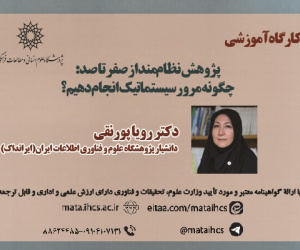إداره وتنظیم مؤسسات الدوله وفق الشریعه الإسلامیه والقانون العراقی
آرشیو
چکیده
إنّ إداره وتنظیم مؤسسات الدوله فی العراق وفقاً للشریعه الإسلامیه والقانون العراقی یمثل موضوعاً بالغ الاهمیه یستدعی إجراء دراسات وبحوث عمیقه. یشکّل العراق بتنوعه الثقافی والدینی تحدّیاً حقیقیاً فیما یتعلق بإیجاد التوازن المناسب بین مبادئ الشریعه الإسلامیه والقوانین الوضعیه التی تنظّم الدوله. تاریخیاً، عرف العراق تقلّبات سیاسیه واقتصادیه، مما منح إداره وتنظیم مؤسساته الحکومیه أهمیه خاصه. فی الفتره الأخیره، شهد البلد تغیّرات جذریه على مستوى السیاسه والحکومه نتیجه للتحولات الاجتماعیه والسیاسیه. وفی الوقت نفسه، تشیر الشریعه الإسلامیه إلى مصدر رئیسی للتشریع فی العراق، مما یعکس الهویه الإسلامیه للبلاد والنسبه العالیه للمسلمین فیه. ومع ذلک، یجب تحقیق توازن بین المبادئ الشرعیه وحقوق المواطنین والالتزامات الدستوریه. ومن هذا المنطلق، تطرّقنا فی هذا البحث إلى التفاصیل ذات الصله بإداره وتنظیم مؤسسات الدوله وفق الشریعه الإسلامیه والقانون العراقی بالاعتماد على المنهج الوصفی التحلیلی. تشیر نتائج البحث إلى أنّ الشریعه الإسلامیه تلعب دوراً مهماً فی تنظیم المؤسسات فی العراق وفقاً للدستور والتشریعات القانونیه، حیث یعتبر الإسلام دین الدوله الرسمی ومصدراً أساسیاً للتشریع. یجب على المشرعین والجهات الحکومیه الالتزام بمبادئ الإسلام فی صیاغه القوانین والسیاسات. تواجه المؤسسات الحکومیه فی العراق تحدیات مثل الفساد ونقص التمویل، وتحتاج إلى إصلاحات لتحقیق العداله والشفافیه. التوافق بین القانون المدنی والشریعه یعمل فی بعض القضایا مثل الأحوال الشخصیه، وهذا یتطلب إشرافاً دقیقاً. یجب أن یستمر التوجیه الإسلامی فی توجیه السیاسات والتشریعات بطریقه تحقق العداله وتحترم القیم فی العراق.Management And Organization Of State Institutions In Accordance With Islamic Sharia And Iraqi law
The management and organization of state institutions in Iraq according to Islamic Sharia and Iraqi law represents a critically important topic that warrants in-depth study and research. Iraq, with its cultural and religious diversity, poses a real challenge in finding the appropriate balance between the principles of Islamic Sharia and the secular laws that govern the state. Historically, Iraq has experienced political and economic fluctuations, making the management and organization of its governmental institutions particularly important. Recently, the country has witnessed radical changes at the political and governmental levels as a result of social and political transformations. At the same time, Islamic Sharia is a primary source of legislation in Iraq, reflecting the country's Islamic identity and the high percentage of Muslims. However, a balance must be struck between legal principles, citizens' rights, and constitutional obligations. Based on this, this research addresses the details related to the management and organization of state institutions according to Islamic Sharia and Iraqi law, relying on a descriptive and analytical approach. The results of the research indicate that Islamic Sharia plays an important role in regulating institutions in Iraq according to the constitution and legal regulations, as Islam is considered the official state religion and a primary source of legislation. Legislators and government agencies must adhere to Islamic principles in formulating laws and policies. Government institutions in Iraq face challenges such as corruption and underfunding, and reforms are needed to achieve justice and transparency. Compatibility between civil law and Sharia law operates in some areas, such as personal status, and this requires careful oversight. Islamic guidance must continue to guide policies and legislation in a way that achieves justice and respects Iraqi values.






